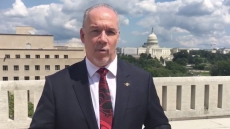OTTAWA - The Supreme Court of Canada will revisit the decisions of courts in British Columbia and Ontario that said the federal law allowing prolonged solitary confinement in prison was unconstitutional.
The high court agreed Thursday to jointly hear the federal government's challenges of the provincial appeal-court decisions.
The Supreme Court also said it would hear cross-appeals from civil liberties groups in each case that argue the provincial decisions did not go far enough.
Although it contested the appeal-court decisions, the federal government brought in new legislation it said would end the practice of segregating prisoners who pose risks to security or themselves.
The government says inmates requiring isolation will be kept in "structured intervention units" that allow better access to programming and mental-health care.
Human-rights organizations have criticized the changes as a mere rebranding of the practice with insufficient safeguards.
As usual, the Supreme Court gave no reasons Thursday for agreeing to hear the cases. But the high court's coming review will give the federal government, civil liberties groups and other concerned parties an opportunity to stake out their positions on the highly controversial issue.
"It is disappointing that the federal government continues to fight for the right to keep prisoners in prolonged solitary confinement," said Michael Rosenberg, a lawyer for the Canadian Civil Liberties Association.
"The courts have held that this is cruel and unusual treatment."
In finding the practice unconstitutional last March, Ontario Court of Appeal placed a hard cap on solitary confinement, saying inmates could no longer be isolated for more than 15 days due to "foreseeable and expected harm which may be permanent" from prolonged segregation.
In June, the British Columbia Court of Appeal said the practice violated the right to life, liberty and security of the person in allowing indefinite isolation and failing to provide external review of decisions to segregate inmates.




